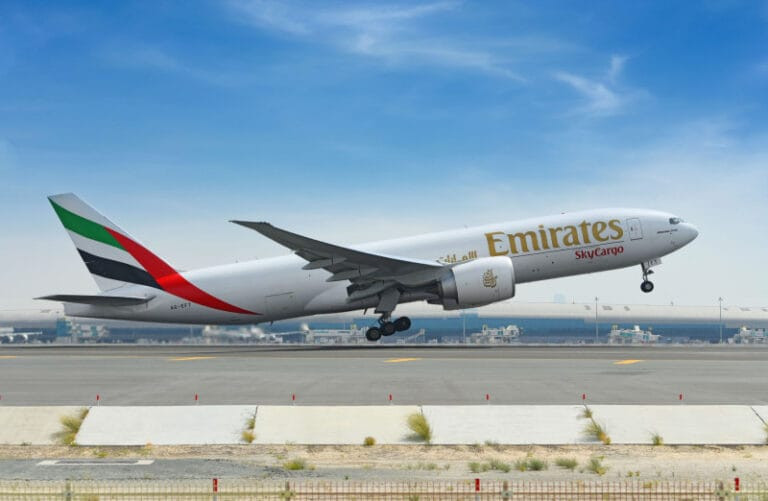Airfreight trade lanes in the Americas are largely driven by the flow of commodities. There is a significant volume of flowers and fresh fruit moved from South America into Europe, e-commerce shipments into all US gateways, as well as a significant volume of pharmaceuticals.
Trade lanes continue to shift in response to geopolitical events that disrupt supply chains, such as the challenges with ocean freight. Considering that ocean freight accounts for approximately 90 percent of global trade volumes, any disruption will have a knock-on effect on airfreight, leading to a crunch on capacity, which was already stretched, coming through the pandemic.
“Throughout 2024, our offering has been in consistently high demand, both globally and in the Americas, with longstanding and new customers valuing our innovative product portfolio, extensive global widebody network and world-class capabilities,” Christel Alamo, Vice President of Cargo Commercial – Americas at Emirates SkyCargo, stated.
“Demand in the Americas is driven by pharmaceuticals and healthcare, seasonal perishable items such as fresh fruits, seafood, meat and, a very healthy flower business. We also see the growing demand for e-commerce in the Americas, along with high tech equipment such as personal devices and automotive spare parts.
“In the last financial year we moved 2.2 million tonnes of cargo worldwide, and we are on track to surpass this in the current financial year, with healthy load factors across our network.”
Keeping pace
Perishables is Emirates SkyCargo’s largest business unit by tonnage, with an average 900 – 1,000 tonnes travelling on its flights across the world every day. This is reflected in the Americas, where it remains the airline’s biggest uplift, with commodities typically consist of seasonal fruits, lobsters and seafood, meats and flowers.
To cater to the different types of temperature-sensitive products, the carrier has invested significantly in cool chain infrastructure, both at its hub in Dubai and across our network. Underpinned by advanced technology and innovative equipment, this ensure that sensitive cargo travels in a consistent environment throughout its journey, with rapid transit from origin to destination in as little as 24-48 hours, with fit-for-purpose care at every touchpoint.
“The rapid growth in airfreight demand puts a strain on infrastructure at some airports, and there is an urgent demand for modernisation across the supply chain,” Alamo outlined.
“We have invested in our operations to ensure our customers’ shipments move around the world quickly, reliably and efficiently. For example, we have built a global network of pharma corridors, which enable us to connect origin and destination stations with consistently high standards of cold-chain protection.
“Working collaboratively with ground handling partners, we have equipped key pharma markets with fit-for-purpose infrastructure and expert personnel to seamlessly handle healthcare cargo, and further mitigate risks in transit. Our purpose-built facility at Chicago airport is a prime example, and now serves as a blueprint for other stations worldwide.”
New solutions
There is a growing need for technology and digital tools to help manage the demand for airfreight and optimise global supply chains. AI and machine learning algorithms offer opportunities for air cargo companies to refine route planning, implement predictive maintenance strategies for their fleet, and improve overall operational efficiency, while automation and robotics would streamline workload management in warehouses which would go some way in solving the current congestion challenges the industry faces.
“We will continue to explore ways to integrate technology and digital solutions into our operations to enhance and elevate our offering, without compromising on our exceptional customer service, which is the cornerstone of our brand,” Alamo highlighted.
Environment and sustainability also remains a challenge across the industry, driven by both regulatory changes and customer demand. Reducing the impact of fossil fuels in commercial aviation remains our biggest challenge, which is why Emirates has created a US$200 million Sustainability Fund, dedicated to research and development into fuel and energy solutions.
Since it was announced in 2023, the carrier has disbursed funds into key projects, such as the Aviation Impact Accelerator (AIA), where it serves as industrial partner across a number of climate impact projects.
“We are committed to integrating meaningful sustainability practices into our air cargo operations, through efficiency initiatives,” Alamo stated.
“For example, we ensure our aircrafts are loaded with a heavier tail-end, to improve aerodynamics and reduce fuel consumption; and operate a comprehensive fuel efficiency programme that implements ways to reduce unnecessary fuel burn and emissions, wherever it is operationally feasible.
“Emirates is also a global leader in the fight against illegal wildlife trafficking and exploitation, with the aim to protect the beauty and biodiversity of the natural world to serve as an inspiration for travel now and for future generations. At Emirates SkyCargo, we have a longstanding, zero-tolerance policy on illegal wildlife trade and a complete ban on hunting trophies for the Big Four. In addition to Emirates SkyCargo staff, wildlife awareness training has also been extended to staff in passenger services, including Cabin Crew, Emirates Airport Services and the Emirates Group Security team to help stop illegal wildlife trafficking in its tracks.
“Last year, the Emirates Group achieved the IEnvA Stage One certification, which is a testament to our longstanding commitment to impactful environmental sustainability initiatives. We remain committed to robust initiatives that will drive real change both within our own operations and across the industry.”





